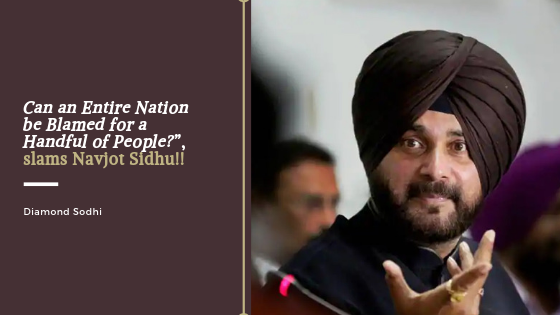
Can an entire nation be blamed for a handful of people?“, was the despairingly controversial statement by the voluble Navjot Singh Sidhu regarding the forty slain CRPF soldiers in the Pulwama attack in J&K by a terrorist outfit within the safe havens of Pakistan. Strong reactions gushed in, mostly condemning the cabinet minister’s insensitivity and his politicness at absolving Pakistan from being targeted as a terrorist nation.
Clarifications and imputations of his statement distortion are being aired along with sparse support mobilized to get him out from under the fire. But the air is too thick with anger and grief to wind down the hysteria and emotions that are running high. A relook into his statement is being mooted in for changing the public perception on what he along with his defenders explain as a staid approach for an amiable permanent recourse to the Indo-Pak bad spleen.
It ’s rough weather for you, Mr. Sidhu, to put it right and to put it straight! And…. I don’t believe I’m writing this stuff, for I’d be the last interested person in writing a blog on anything that’s “political”. But, despite just having surprised myself on that, I have this irresistible urge to tell you just what was not right about what you said, Mr. Sidhu.
Actually, there was nothing wrong about what you spoke- but the timing was insanely out of whack. Did you seriously expect kind reactions coming in for your pastoral advice at a time when the country was torn up over the savage attack? Your sending good tidings was the unbefitting moment when the country awaited a verdict on a punishment to be pronounced. You literally sounded like a judge counseling for behavior correction instead of pronouncing a punishment quantum.
And while your intentions may have been sincerely nationalistic, you ended up sounding daft and agnostic, with mala fide intentions at taking under your wings your “friend” whose swearing-in ceremony as the Prime Minister of Pakistan recorded your fervent appearance and your comradely hug with the Army Chief General of Pakistan raised many a brows on the unwarranted protocol. A philanthropic touch coming out of the left- field would end up in a sinister judgment of your connotation. Being a player, you should’ve known it all.
Taking on your controversial question about whether an entire nation can be blamed for a handful of people, my definite response to this is “Yes, within the context of this situation.” The soldiers who were mascaraed for standing guard to the country’s borders were one of the many who had been martyred before. We don’t even know their names, and we don’t want to know their names. There is a sense of solidarity in the fact that they were Indians and Indian soldiers. There is unfeigned empathy by this everyman who is not feeling it just to make it to political speeches and statements. There has and always will be functional national unification at such moments in history and in time.
Maybe I can break this down for you-you are an individual amongst family and friends, a Congressman when you became politically affiliated, a Parliamentarian when you were voted into power, and you were “India” when you represented your country in Pakistan- you were an amalgamation of the good, bad and the ugly, as you like to put it. Similarly, the psychological response to any act of terrorism from the Pakistani soil is “Pakistan”. It is disillusioning to hear you preach altruism from behind your Z Plus security cover when the soldiers standing wall on the frozen heights bore the brunt for keeping us safe. People were emotionally wounded and listened to you for a solid assurance of avenge with raw energy in their hearts. Nobody is asking for war, but an on the nose riposte-anything to pass on to them the heat we feel, in terms of severe sanctions and stern censures. Your robust idea of a continued peace dialogue just sounded too thwarted with the soldiers’ coffins in sight. All anyone needed was an analgesic to stomach the shock and to deal with the powerlessness and not a promise of blood.
Your terse oratorical skills have almost always surpassed your contemporaries, but this was a time when you could’ve done with some ‘silence’- it would’ve worked better, for us and more for you!
